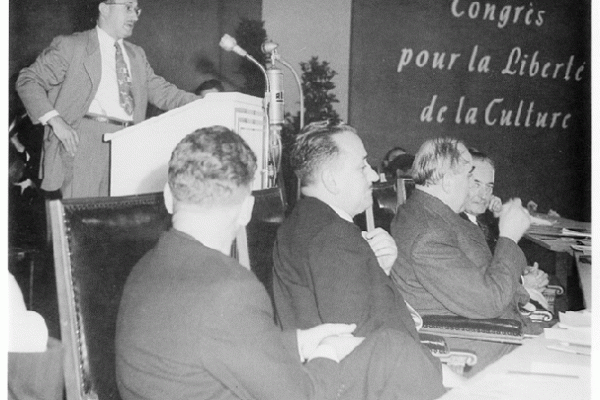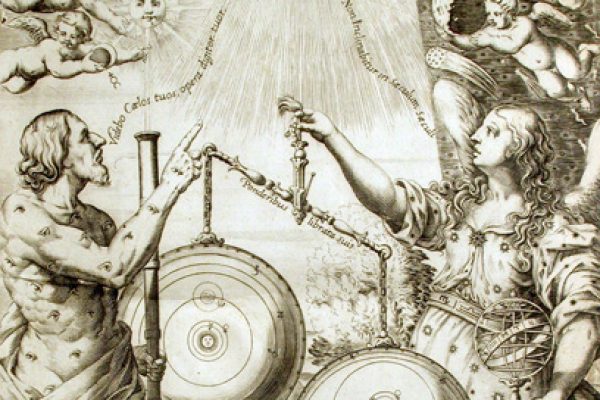The Internet may well have its downsides, but it also has the potential to make us collectively smarter, according to open-science advocate Michael Nielsen. In Reinventing Discovery: The New Era of Networked Science, Nielsen argues that networked digital tools, such as discussion boards and online marketplaces, can make it easier for scientists to pool their data, share methodologies, and find far-flung collaborators. Even non-scientists are participating in large-scale citizen science projects. In Nielsen’s view, however, public policy has yet to catch up to technology. The digital environment will amplify our collective intelligence, but only if there are incentives for people to share.
Editorial assistant Lindsey Gilbert asks Nielsen about what science looks like now, the changing role of academia, and whether collective intelligence might also transform politics.
Lindsey Gilbert: In Reinventing Discovery, you talk about two distinct eras: the era of pre-networked science and the era of networked science. What separates the two eras? Is it only the Internet, or are there other things?
Michael Nielsen: There are many other things. The Internet is a piece of technology that started to be deployed back in the ’70s and obviously has been gradually improved ever since. (I’m talking about TCP/IP, the protocol.) The point about networked science is that what is required for it to come to fruition is actually a whole set of cultural changes within science. And that has got nothing to do with the technology directly. It’s about what our expectations are, about how scientists behave, about what they are rewarded for, and about what they see as doing their jobs. And that’s something that is only gradually changing. Year to year, it looks like it is only changing very slightly. But I think that over just a few decades, in fact, it will be completely transformed.
LG: You propose that when people use online tools to collaborate, they can become collectively smarter. What is collective intelligence, and how is it different from plain old intelligence?
MN: It’s a very old concept, of course. Everybody knows that sometimes, at least, when you’re in a group with a bunch of other people, it can become easy to solve problems that you might have thought were extremely challenging or maybe beyond your capabilities at all. What’s new, and what’s interesting, is the possibility that actually we can go much further than before. We can use online, networked tools to enable groups to work together—sometimes better, and sometimes on a scale that was formerly unimaginable.
We don’t yet have a group da Vinci. We can’t take a thousand people and get something like the Mona Lisa.
LG: I’m interested in what science looks like now. When Archimedes was struck by his famous principle, he supposedly leaped out of his bathtub and shouted “Eureka!” Are today’s scientists all alone in their laboratories shouting “Eureka”?
MN: It happens. I suspect that even the Archimedes story is apocryphal, although it would be lovely if it were true. I think it was Isaac Asimov who said that what a scientific discovery really looks like—a big breakthrough—isn’t somebody shouting, “Eureka, I found it,” but rather one scientist talking to another scientist whom they have maybe just met and saying, “That’s funny,” because something isn’t quite making sense. It is often out of those little things that in fact the big discoveries can grow. When something doesn’t quite match your expectations of how you think the world actually is, people will often build on that, and they will realize that what seems like a minor discrepancy can actually turn into a really, really big thing.
LG: In the open-source world that you describe, people with micro-expertises would make micro-contributions to sprawling, networked projects. At the moment, many of us are reconsidering the value of a liberal education. Does it still make sense to have the Renaissance man, as it were, as our ideal, or should we be moving towards micro-specialization?
MN: You’ve framed that as a choice, a dichotomy; you choose one or the other. But actually I think it’s much more complicated than that. First of all, when you have got billions of people and ever more of them are working to create new types of knowledge—we have several million scientists working—at some level it’s inevitable that there is going to be specialization. There’s no way I could follow what five million scientists are doing. Obviously that’s just impossible. But with that said, there is the question, “Where should I as a scientist apply my talents, and what sorts of things should I learn?” What you want to have is all these different kinds of knowledge—a very broad understanding of how science and human knowledge more generally fit together. What’s interesting? What are the boundaries of what is known? And then you start to gradually develop in certain narrow areas a higher-resolution understanding. You actually want both a good broad general understanding—just so you understand what the right questions are to be asking—and the detailed domain expertise that is necessary to forge ahead. So the answer is both.
LG: In the future, scientists may be relying on open-source projects and data sharing. As you well know, not everyone wants to share. Why do scientists lock up their data?
MN: To some extent, it’s just a question of, “What are the incentives for people to take their best ideas and take their data and share it out on the network?” If you go back to the seventeenth century, a lot of the early scientists were very reluctant to share anything at all. You have this idea of the alchemist, who would write down his private secret notes, and sometimes he would go to his grave with them. Fortunately, we have moved away from that, but it’s still true today that it is not necessarily in people’s best interest to share their ideas too broadly around too early—partially just because it can take a lot of time, and partially because people want to get the credit for those ideas, and they don’t necessarily see it as being in their best interest to share them broadly.
We don’t yet have a group da Vinci. We can’t take a thousand people and get something like the Mona Lisa.
LG: Maybe you could talk about what’s going on right now in what you call “open science.” What’s the most interesting development you have seen so far?
MN: A project that I really like a lot is one called the Polymath Project, which has involved a large number of people, mostly mathematicians, from all over the world. They have started using blogs and wikis to collaborate together on difficult, unsolved mathematical problems. It’s a place where they can pool all their different types of expertise, hopefully get a conversation going, and maybe make some progress on problems that any individual amongst them might find very, very challenging. They have had some big successes. They have also had some other projects that haven’t gone so well, which is about par for the course in research. If you’re not having a lot of failures, it means you’re trying problems that are too easy. But it is exciting to see them doing this and pioneering a new way of doing research.
LG: If all goes as you hope it will, collective intelligence will change the way we answer scientific questions. But what about problems outside the hard sciences—problems of public policy and social justice, for example? Could collective intelligence also transform politics?
MN: Maybe. Obviously there’s been a lot of publicity around the Arab Spring and the use of social media. A real debate has gone on about how significant social media has been in those kinds of things. I’m a bit skeptical—in fact I’m very skeptical—about that. One thing you see in a lot of the open-science projects is that people with different insights can agree with one another, which really helps them along. Somebody will say, “Here’s a great idea that will help solve this scientific problem,” and other people will immediately come in and say, “Oh yes. You’re right, that’s a terrific idea,” and they add it into the canon of knowledge. They build up, gradually, a deeper and deeper understanding of the problem that they are trying to solve. What’s happening there is that people are able to agree on when progress is being made.
Now, that all sounds like motherhood and apple pie. But then you think about, let’s say, discussing a political problem. Maybe it’s a question like, “Should the drinking age be lowered?” There are a whole of lot of facts that are relevant to that. But there are also a whole lot of values that are relevant to that, and it’s hard to get people to agree on when you’re making progress in a discussion. It really limits the extent to which you can benefit from a collective approach to solving that kind of a problem. If one person has religious objections to people drinking at all, it’s just going to be difficult for that person’s insights to be integrated with somebody else who thinks that the drinking age should be lowered to seventeen. Instead, the discussion will tend to fragment around that difference in values. So I think it’s very hard, except for the kinds of problems where there is this shared common understanding of what it means to make progress.
LG: What about humanities and the arts? Would there be any way to use online tools there to amplify our collective intelligence, or is the idea of collaborative art an oxymoron?
MN: Well, there are lots of experiments. There have been things like attempts to do collective drawing applications, where hopefully you get lots of artists to come in together and maybe create something beautiful. Unfortunately, mostly they haven’t worked very well. I’m optimistic that maybe what’s going on is that we just haven’t found quite the right pattern yet. You do see some very beautiful things done occasionally. On YouTube, there are some beautiful collective choirs, where hundreds of people from all over the world will contribute a YouTube clip of themselves singing some song. The collective can have its kind of beauty in that way. It seems to me that we are still lacking some key ideas or key tools necessary to do that really well. We don’t yet have a group da Vinci. We can’t take a thousand people and get something like the Mona Lisa.
LG: In Reinventing Discovery you talk about “citizen science.” I’m wondering what that is. All of us have free time. Should we be spending it on citizen science? Can amateurs and hobbyists really contribute to scientific discovery?
MN: For hundreds of years now, amateurs have participated in science in various ways. One area where they’ve done a lot is in ornithology. Amateur birdwatchers have been really important for a long time. The exciting thing that’s happening now are these new citizen science projects, which connect amateurs with, say, the astronomy community (or many different scientific communities) to help out in solving some of the problems that astronomers have. There’s a nice project called Galaxy Zoo, which involves a quarter of a million people who are helping to analyze galaxy images. They’ve made all sorts of discoveries. They’ve written 22 scientific papers, and they’ve discovered an entirely new class of galaxy, among other things. You ask whether or not we should take some of our spare time and do it. I don’t know. I don’t think there is a moral dimension to it. It’s not a question of whether people should or not. It’s just a question of whether or not they’d enjoy doing it and maybe get some value or meaning out of it for themselves.
LG: You say that Galaxy Zoo has produced a certain number of papers. Who is writing those papers? The citizen scientists?
MN: So far in the case of Galaxy Zoo, most of the work on the papers has been done by professional astronomers who are running the Galaxy Zoo website, sometimes with considerable input from the amateurs. Galaxy Zoo participants have certainly been listed as coauthors on some of the papers. It depends on the paper. I mentioned this new type of galaxy discovery that they made, for example. In that case, the amateurs did a lot of really quite important analysis in advance. They systematically hunted down a number of these galaxies, and that was impressive.
LG: Let’s talk about academia. I’m wondering about the role of universities in contributing to open science. Are universities standing in the way?
MN: By and large, they’re not standing in the way except through inertia. As a scientist, you build your career by publishing papers, basically. If you’re spending a lot of time doing that, it’s hard to make time to, say, share your ideas online or to share computer code online or any of the other things you might potentially be doing, even though those things have tremendous scientific value. So, in some sense, the entrenched system of reward that universities use is standing in the way of open science, but it’s not because of anything malicious on anybody’s part. It’s just that we have this established system, and it’s very difficult to get everybody to change at the same time.
LG: Some people think that the Internet is not a new tool that we can use, but rather a new paradigm that is circumscribing and containing our lives. What do you think?
MN: People are right to worry about questions like, “Is the Internet causing us to become too distracted? Is it causing us to be dumbed down?” All these kinds of questions—it’s certainly good to be asking them and to be looking for evidence. On the other hand, it’s also true that whenever you have any kind of a new tool, it’s possible to misuse it. It can be hard to learn how to use the Internet effectively. How do you develop attentional literacy, the ability to be working on the right stuff at the right time and not necessarily frittering your time away, looking at Facebook and whatever else it is you do? I think that as time goes by, people will get better at minimizing any negative aspects, and they will start to use the more powerful aspects of this tool more effectively. That’s part of the benefit, I guess, of asking the skeptical questions—it will hopefully enable us to get more out of the tool.








